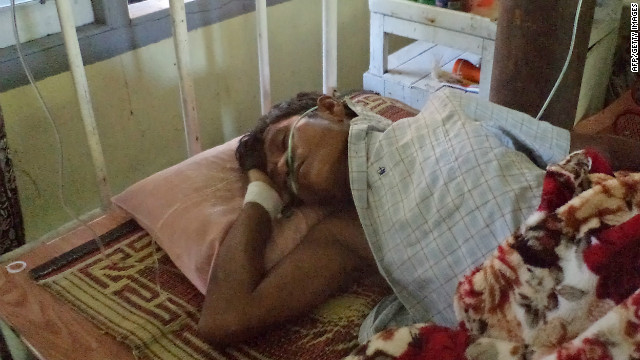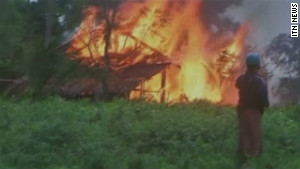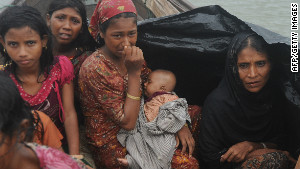Bangkok, Thailand (CNN) -- More than 1,000 homes
have been set ablaze amid sectarian clashes between Buddhists and
Rohingya Muslims in Myanmar's volatile west as security forces struggle
to bring some semblance of order to the countryside.
In an effort to clamp
down on the unrest, authorities sent extra security forces to the state
of Rakhine, where at least 50 people have been killed and dozens more
wounded, state officials said Thursday.
Overnight curfews, in
effect since a severe outbreak of communal violence during May and June,
have been lengthened in several townships, said Myo Than, manager of
the state government's information department.

An injured Buddhist man lies in a hospital in Sittwe, capital of Myanmar's western Rakhine state on October 23, 2012

Religious clashes devastate Myanmar

Myanmar erupts after rape, murder report
Rakhine is home to the
Rohingya, a stateless Muslim minority who say they have been persecuted
by the Myanmar military during its decades of authoritarian rule.
Myanmar does not recognize them as citizens.
The clashes between the
majority Buddhists and the Rohingya minority during the summer killed at
least 88 people -- mostly Rohingya -- according to state-run media.
The violence in May
erupted after police detained three Muslim men on accusations they raped
and killed a Buddhist woman. Clashes spread, prompting the government
to deploy the military to restore order.
Hundreds of Rohingyas tried to cross the border into neighboring Bangladesh, but were turned back.
Bangladesh said it already had too many Rohingya refugees, estimating that about 300,000 live in the country.
Even after the killing stopped, simmering tensions remained in Rakhine, as shown by the resumption of violence this week.
Those who lost their
homes have had to live in refugee camps. About 75,000 people were
displaced, according to the U.N. Office for the Coordination of
Humanitarian Affairs in Myanmar.
Myo Than said the
government is aiming to return the situation to normal by organizing
negotiations between the two sides and increasing security.
State officials say they
have sent medical teams accompanied by military personnel to two of the
remote townships hit by unrest to offer treatment to Rohingya people
too scared to go to a hospital.
Journalist Phyu Phyu Zin in Yangon, Myanmar, contributed to this report.
No comments:
Post a Comment